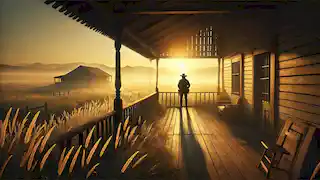The South" by Jorge Luis Borges
Reading time: 12 min
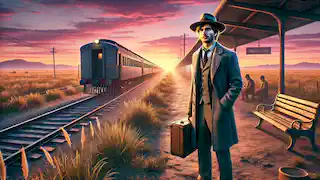
About this story: The South" by Jorge Luis Borges is a Realistic Fiction from Argentina set in the 20th Century This Descriptive tale explores themes of Loss and is suitable for Adults. It offers Cultural insights. A journey into the Argentine south reveals unexpected truths and confrontations.
The journey began in the autumn of 1939. Juan Dahlmann, the grandson of Johannes Dahlmann, a German immigrant who settled in Argentina during the 19th century, was finally able to realize his dream of spending time at his family’s rural estate in the south. For years, Juan had worked tirelessly as a librarian in Buenos Aires, but he had always nurtured an idealized image of his ancestral home, imagining it as a symbol of both his heritage and his personal identity.
His story, like so many others, starts with an unexpected event—a book. Dahlmann had just acquired a rare edition of *The Thousand and One Nights* and, in his eagerness to read it, neglected to watch where he was going. He bumped his head against a half-open door and suffered an injury that seemed trivial at first but quickly became serious, leading to a prolonged and life-threatening illness.
The Fall and the Recovery
Dahlmann’s illness was a blow to his spirit. For days, he hovered between life and death, lost in delirium, as doctors worked to treat an infection that had set in after his head injury. It was a time of feverish dreams, a haze of endless nights and painful moments of consciousness. At times, Dahlmann felt himself slip into the depths of time, where his ancestors seemed to beckon him.
It was not until months later that Dahlmann recovered. His body was weakened, but his mind was still consumed by one desire: to visit his family’s ranch in the south. He believed that the fresh air of the countryside, the vast open spaces, and the quiet of rural life would help him regain his strength and restore his soul.
Finally, in the late summer, Dahlmann was well enough to make the journey. He boarded the train that would take him south, carrying with him only a few essentials and his prized copy of *The Thousand and One Nights*. The south was no longer just a dream—it was now a tangible goal, and Dahlmann was filled with a mixture of excitement and trepidation as the train slowly made its way out of the city and into the open plains.
As the city receded into the distance, Dahlmann felt the weight of his illness lift from his shoulders. The landscape outside the train window—fields of wild grass stretching endlessly toward the horizon—was a balm for his tired soul. He was traveling toward his origins, toward the land where his ancestors had made their lives. For the first time in months, Dahlmann felt a sense of peace.
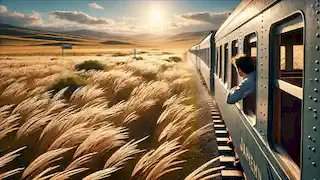
The Train South
The train ride was long and uneventful. Dahlmann spent much of the time gazing out of the window, watching the countryside change as the train moved further south. At first, the landscape was familiar—green fields, small towns, and scattered trees—but as the train ventured deeper into the country, the scenery became more desolate. The vegetation thinned, the towns grew smaller, and the horizon seemed to stretch on forever.
Dahlmann thought about his ancestors as the train rolled through the vast expanse of the Pampas. He remembered the stories his grandfather had told him about the old ranch in the south, about the hard work and the isolation of life on the frontier. In those days, the south had been a wild and dangerous place, a land of gauchos and outlaws, where men lived by their wits and their strength.
But that was a long time ago. Now, the south was a place of peace, a quiet retreat from the bustle of the city. Dahlmann imagined the ranch as a sanctuary, a place where he could rest and recover, far from the noise and chaos of Buenos Aires.
As the sun began to set, the train made a stop at a small station. Dahlmann stepped out onto the platform to stretch his legs. The air was cooler now, and the sky was tinged with the pinks and oranges of the setting sun. The station was quiet, and there were only a few other passengers milling about. Dahlmann felt a strange sense of anticipation, as if something important was about to happen, though he couldn't say what.
When the train resumed its journey, Dahlmann returned to his seat and opened his book. He had been carrying *The Thousand and One Nights* with him since his illness, but he had not yet found the time to read it. Now, as the train rocked gently along the tracks, he lost himself in the stories of ancient kings and magical lands.
It was nearly midnight when the train finally arrived at Dahlmann’s destination. He stepped off the train and looked around. The station was small and dark, with only a few dim lights casting long shadows across the platform. There was no one waiting to meet him, but that was no surprise—Dahlmann had not told anyone he was coming. He picked up his bag and began to walk toward the exit.
As he stepped outside, Dahlmann was struck by the stillness of the night. The air was cool and crisp, and the stars shone brightly overhead. The countryside stretched out before him, dark and silent, and for a moment, Dahlmann felt a sense of profound loneliness.
The Tavern in the South
Dahlmann walked for what felt like hours along the dusty road leading from the station to the ranch. The night was quiet, save for the occasional rustle of leaves or the distant cry of an owl. The road seemed endless, and Dahlmann began to feel the fatigue of his journey weighing on him.
Just when he thought he might collapse from exhaustion, Dahlmann saw the faint glow of lights in the distance. As he got closer, he realized it was a small tavern, nestled by the side of the road. It was a simple building, with whitewashed walls and a thatched roof, but it was a welcome sight.
Dahlmann stepped inside, grateful for the warmth and the light. The tavern was nearly empty, save for a few men sitting at a table in the corner. The air was thick with the smell of tobacco and wood smoke, and the faint sound of a guitar could be heard in the background. Dahlmann ordered a drink and sat down at a table near the window.
As he sipped his drink, Dahlmann felt the weariness of the journey begin to melt away. The warmth of the fire and the quiet murmur of voices in the tavern soothed him, and for the first time in days, he felt truly relaxed.
But his peace was short-lived. From the corner of his eye, Dahlmann noticed one of the men at the table was watching him. The man was tall and broad-shouldered, with a weathered face and a thick black mustache. There was something about the way he looked at Dahlmann that made him uneasy.
The man stood up and walked over to Dahlmann’s table. He stopped in front of him, looking down with a sneer. “What brings a city boy like you out here?” the man asked, his voice rough and mocking.
Dahlmann tried to ignore him, but the man persisted. “You don’t belong here,” he said, his voice louder now. “This is no place for a soft city man.”
The other men in the tavern turned to watch, and Dahlmann could feel their eyes on him. His heart raced, but he did his best to remain calm. He knew there was no point in arguing with the man.
Without a word, Dahlmann stood up and walked toward the door. But before he could leave, the man grabbed him by the arm. “I’m not finished with you,” he said, his grip tightening.
Dahlmann turned to face him, his eyes cold and steady. “Let go of me,” he said quietly.
For a moment, the man hesitated, but then he released his grip and stepped back. Dahlmann walked out of the tavern, his heart pounding in his chest.
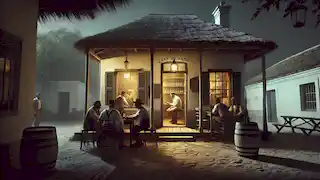
The Duel
Dahlmann walked down the road, trying to shake off the encounter at the tavern. He could still feel the man’s eyes on him, and the memory of his mocking voice echoed in his ears. But as he continued walking, the night grew quieter, and soon the tavern was far behind him.
He was nearly at the ranch when he heard footsteps behind him. Dahlmann turned to see the man from the tavern, along with two others, walking toward him. They were laughing and talking loudly, and their voices carried in the still night air.
Dahlmann’s heart sank. He knew what was coming.
The men caught up to him, and the one who had taunted him in the tavern stepped forward. “I told you we weren’t finished,” he said, his voice low and threatening.
Dahlmann didn’t respond. He knew there was no point in arguing with these men. They had already made up their minds.
Without warning, the man pulled a knife from his belt and tossed it at Dahlmann’s feet. “Let’s settle this like men,” he said, a cruel smile playing on his lips.
Dahlmann stared at the knife for a moment, his mind racing. He had never been in a fight before, let alone a duel with knives. But he knew that there was no way out of this. If he refused, the men would mock him, and he would never live it down.
With a heavy heart, Dahlmann bent down and picked up the knife. The weight of the blade in his hand felt foreign
and unnatural. He looked at the man across from him, his face twisted in a sneer, and knew that he was in over his head.
The two men squared off, their eyes locked. For a moment, the world seemed to stand still. The night was quiet, and the only sound was the faint rustle of the wind through the grass.
Then, without warning, the man lunged at Dahlmann. The blade flashed in the moonlight as he slashed at him, but Dahlmann managed to dodge the blow. His heart raced as he tried to keep his distance, but the man was relentless, attacking again and again with brutal force.
Dahlmann could feel the panic rising in his chest. He had no experience with knives, no skill in fighting, and he knew that it was only a matter of time before the man landed a fatal blow.
But then, something strange happened. As the fight dragged on, Dahlmann felt a change come over him. The fear that had gripped him at the start of the duel began to fade, replaced by a strange calm. He no longer thought about winning or losing, about life or death. He simply moved, reacting to the man’s attacks without thought or hesitation.
For what felt like hours, the two men circled each other, their knives flashing in the darkness. Then, in one swift motion, Dahlmann struck. The blade sank into the man’s side, and he staggered back, his eyes wide with shock.
The man’s companions rushed to his side, but it was too late. He collapsed to the ground, his blood staining the grass beneath him.
Dahlmann stood there, his chest heaving, his knife still clutched in his hand. He had won, but there was no sense of victory, no feeling of triumph. Only a deep, hollow emptiness.
Without a word, Dahlmann turned and walked away, leaving the men behind.
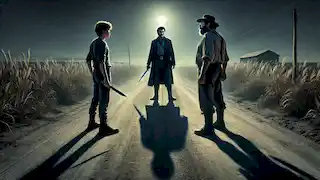
The Return Home
Dahlmann reached the ranch just as the sun was beginning to rise. The sky was a pale pink, and the first rays of light were breaking over the horizon. The air was cool and still, and the world seemed to be holding its breath.
As he stepped onto the porch of the old house, Dahlmann felt a wave of exhaustion wash over him. His body ached from the long journey, and his mind was still reeling from the events of the night. He sank down onto the steps and buried his face in his hands.
For a long time, Dahlmann sat there, lost in thought. The events of the night played over and over in his mind, and he found himself questioning everything he had ever believed about himself, about the world.
He had come to the south seeking peace, seeking a connection with his past, but all he had found was violence and death. The south was not the idyllic retreat he had imagined—it was a place of danger, a place where men still lived and died by the knife.
Dahlmann had always thought of himself as a civilized man, a man of the city, but now he was not so sure. The duel had awakened something in him, something dark and primal. He had killed a man, and though it had been in self-defense, he knew that his life would never be the same.
As the sun rose higher in the sky, Dahlmann stood up and walked inside. The house was quiet and empty, just as he had left it. He wandered through the rooms, touching the furniture, the walls, the windows, as if trying to absorb the history of the place.
Finally, he stopped in front of a large window that looked out over the fields. The grass was tall and wild, swaying gently in the breeze. In the distance, he could see the faint outline of the mountains, their peaks shrouded in mist.
Dahlmann stood there for a long time, staring out at the land that had once belonged to his ancestors. He thought about his grandfather, about the long days spent working the land, about the hardships and the joys of life in the south.
And he realized that he was not so different from the men who had come before him. He was a part of this land, a part of its history. The south had claimed him, just as it had claimed his ancestors.
With a deep sigh, Dahlmann turned away from the window and walked toward the door. The south was no longer a dream—it was his reality. And he would have to live with it.
